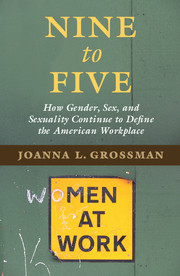Book contents
- Frontmatter
- Dedication
- Contents
- Foreword
- Acknowledgments
- Introduction
- PART I WHAT IS SEX DISCRIMINATION?
- PART II SEXUAL HARASSMENT
- PART III PREGNANT WOMEN AND MOTHERS AT WORK
- PART IV FEMALE BREADWINNERS AND THE GLASS CEILING
- 47 The Supreme Court Slams the Door on Pay Discrimination Claims
- 48 A Call for Congressional Action to Remedy Pay Inequality
- 49 The Lilly Ledbetter Fair Pay Act of 2009
- 50 Taking Stock: Is the Ledbetter Act Working?
- 51 The Lady in Red
- 52 Unfinished Business
- 53 Will ABA's Proposed Solutions for Gender Inequity Work?
- 54 Equality Still Elusive for Women in the Federal Workforce
- 55 “Girlie Men”
- 56 Playing “Too Womany” and the Problem of Masculinity in Sport
- 57 Binders for Women, Blinders for Romney
- Conclusion
- Notes
- Index
50 - Taking Stock: Is the Ledbetter Act Working?
from PART IV - FEMALE BREADWINNERS AND THE GLASS CEILING
Published online by Cambridge University Press: 05 May 2016
- Frontmatter
- Dedication
- Contents
- Foreword
- Acknowledgments
- Introduction
- PART I WHAT IS SEX DISCRIMINATION?
- PART II SEXUAL HARASSMENT
- PART III PREGNANT WOMEN AND MOTHERS AT WORK
- PART IV FEMALE BREADWINNERS AND THE GLASS CEILING
- 47 The Supreme Court Slams the Door on Pay Discrimination Claims
- 48 A Call for Congressional Action to Remedy Pay Inequality
- 49 The Lilly Ledbetter Fair Pay Act of 2009
- 50 Taking Stock: Is the Ledbetter Act Working?
- 51 The Lady in Red
- 52 Unfinished Business
- 53 Will ABA's Proposed Solutions for Gender Inequity Work?
- 54 Equality Still Elusive for Women in the Federal Workforce
- 55 “Girlie Men”
- 56 Playing “Too Womany” and the Problem of Masculinity in Sport
- 57 Binders for Women, Blinders for Romney
- Conclusion
- Notes
- Index
Summary
In just the first year since the passage of the Lilly Ledbetter Fair Pay Act, courts have struggled with its implementation. While it clearly has undone the damage of the Supreme Court's decision in Ledbetter v. Goodyear Tire & Rubber Co., the first round of cases under the act reveal some open questions – and some cause for concern.
To date, the biggest issue to date is this one: How broadly should courts construe the act's coverage of employment decisions that discriminate in compensation? What constitutes a “discriminatory compensation decision or other practice” as defined in the act? One case from the Third Circuit is a good vehicle for exploring these questions.
MIKULA V. ALLEGHENY COUNTY: THE FACTS OF THE CASE
A recent ruling from the U.S. Court of Appeals for the Third Circuit, Mikula v. Allegheny County, illustrates some of the difficulties courts have confronted in applying the Ledbetter Act. In that case, the same panel of appellate judges twice considered the scope of the Ledbetter Act's coverage of pay discrimination claims, with different results each time.
The plaintiff, Mary Lou Mikula, was hired as a county grants manager in 2001. In September 2004, she petitioned the county to change her title to “grants and project manager” and to increase her salary to equal or exceed that of the male “fiscal manager,” who earned $7,000 more annually than she did. The county did not respond. In October 2005, Mikula again lobbied for a pay increase and change in her job title. But the county again failed to respond. In March 2006, Mikula filed an internal complaint with the county's human resources department, in which she compared her job responsibilities with those of the higher-paid fiscal manager and claimed that the pay discrimination began when she was first hired. In an August 2006 letter, the county responded to her complaint, finding her allegations unfounded and stating that her title and salary were “fair when compared with similar jobs.” In April 2007, Mikula filed a Title VII charge for pay discrimination with the EEOC.
The district court dismissed Mikula's claim as untimely under Ledbetter, holding that the unlawful practice occurred in 2001, when Mikula was first hired at a lower salary than her male counterpart.
- Type
- Chapter
- Information
- Nine to FiveHow Gender, Sex, and Sexuality Continue to Define the American Workplace, pp. 294 - 297Publisher: Cambridge University PressPrint publication year: 2016



